What can be more life-impactful than being on your mother’s lap many times before bed and seeing her cry for the loss of your older sister? That image, along with all the stories of how she got sick with Polio after swimming and playing in the polluted Ameca River in Mexico, and the painful progression of her illness with the progressive loss of movement, culminating in her heartbreaking death, shaped Salvador Rico’s mission. As a brave and determined Rotarian from the Rotary Club of South Ukiah D5130, he committed from childhood to make a change, to prevent mothers like his own from suffering the pain of losing a child to any preventable disease.
At the age of 11, Salvador witnessed the River Lerma Santiago in Mexico, filled with floating trash and white foam along the banks as large as houses. He promised to return someday as an adult to clean up the river. From that young age, Salvador began to understand that many health and social problems that communities face are closely related to their surroundings.
When environments and ecosystems are treated solely as sources of extraction or waste disposal, they become deeply altered, leading to worsening health and social problems for humans in those areas. Not only is the contaminated consumption of water a risk, but poor sanitation and hygiene also come with using polluted water for washing, watering crops, and hydrating animals.
When any water body has pollutants, fertilizers from crops brought by rain, and runoff from human discharges, a process called eutrophication begins. Many bacteria, viruses, and algae find the perfect “environment” to grow, making the polluted waters a direct link to diseases such as cholera, diarrhea, dysentery, hepatitis A, typhoid, polio, giardiasis, typhoid fever, E. Coli infection, and salmonellosis, among others. In the United States, a developed country, the CDC estimates that waterborne pathogens cause an estimated 7.15 million illnesses, 118,000 hospitalizations, and 6,630 deaths, resulting in $3.33 billion in direct healthcare costs. Now imagine the statistics of developing countries.
Eleven years ago Salvador saw one of the most polluted rivers in Mexico, due to non-treated discharges from the industry sector and many cities along it. High levels of toxicity have been reported for this river sediments and heavy metals deposits have also been found in the river floating plants.

When Salvador joined Rotary, he finally found a way to put the promise to his mother and himself into action. He sought every possible way to connect all Rotary Areas of Focus into projects that would recover and restore water bodies, preventing future water-related illnesses and social problems. Salvador started joining initiatives in 2009 when his Rotary Club of South Ukiah was invited to the Russian River clean-up. He saw the potential to connect Rotary Clubs to river clean-up initiatives, and that’s where the Clean Rivers of the World project was born. A team of people began spreading the word at District Conferences, RI International Conventions, zone institute meetings, and symposiums. WASHRAG helped launch a River Clean-up Challenge that brought together more than eight countries. This year, Rotary International and the United Nations Environmental Program partnered to launch the Community Action for Fresh Water Partnership, previously called the Adopt-a-River initiative
 From the learnings of his long journey of dedicated work, Salvador invites us to remember these important points:
From the learnings of his long journey of dedicated work, Salvador invites us to remember these important points:
- Create initiatives that connect with other organizations, government agencies, NGOs, educational institutes, and communities to enhance Rotary’s power.
- Incorporate citizen science and data collection in every possible way and report the collected information into the available Rotary platforms.
- Spread the word by remembering we are advocates for those in need.
Just like the Rotary Areas of Focus are interconnected, all rivers connect cities, ecosystems, oceans, and, ultimately, people. We all love the idea of swimming in or jogging along a clear blue river on a hot summer day, so let’s keep connecting all our projects to the surrounding environment and water bodies. In the end, we will help our children, grandchildren, and vulnerable communities have a safer future.
By: Natalia Luque – RC Global Zipaquira 4281 District – Member of ESRAG Communications Team, ESRAG Correspondent for Latin America and ESRAG Latin-American Chapter Communications Team

